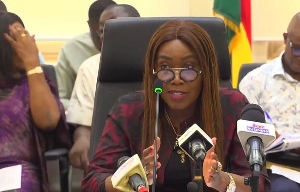- Home - News
- TWI News | TV
- Polls
- Year In Review
- News Archive
- Crime & Punishment
- Politics
- Regional
- Editorial
- Health
- Ghanaians Abroad
- Tabloid
- Africa
- Religion
- Election 2020
- Coronavirus
- News Videos | TV
- Photo Archives
- News Headlines
- Press Release
General News of Saturday, 22 May 2010
Source: Business Analyst
Supreme Court Re-Opens Tsatsu’s Case
…Over IFC’s Immunity
By J. Ato Kobbie
The Supreme Court of Ghana yesterday adjourned to July 6, 2010 to hear afresh an application brought before it by a former Chief Executive Officer (CEO) of the Ghana National Petroleum Corporation (GNPC), Mr. Tsatsu Tsikata, seeking to have the highest court quash a decision of the Appeal Court’s, which conferred on the International Finance Corporation (IFC) immunity from appearing before the courts of Ghana.
The adjournment was occasioned by the absence of the State in court yesterday for the fresh hearing of the case before a reconstituted panel presided over by Mr. Justice William Atuguba. The reconstituted panel has Justices Sophia Akuffo and Vida Akoto-Bamfoe, replacing Justice Alan Brobbey, who recused himself from the original panel, and Justice Samuel Kwadwo Asiamah, who has retired. The other panelists are Justice Julius Ansah and Justice Sophia Adjeibea Adinyira.
The case was first brought before the Supreme Court in December 2006. In his grounds of appeal, Professor Emmanuel Victor Oware Dankwa, counsel for Tsikata, submitted that the Court of Appeal erred by relying on the statutory provision conferring immunity of the International Monetary Fund (IMF) from judicial process, to uphold the immunity claims of the IFC.
Prof. Dankwa argued further that by that grave error of using a statutory provision on the immunity of the IMF, when the case concerned the IFC, the Court of Appeal erred, thereby denying his client the constitutional rights to a fair trial, denying him the opportunity to have his witness heard.
Tsikata’s counsel submitted further that the Appeal Court failed to appreciate that the High Court, having issued a subpoena to the IFC Country Director to attend court to give evidence and produce documents, was misled to set aside that order by counsel for the IFC, who cited a statutory provision relating to the IMF.
Mr. Tsikata, who was standing trial on three counts of causing financial loss to the state and one count of intentionally misapplying public property, sought from the Supreme Court a reversal of a ruling by the Appeal Court on December 19 2006, which endorsed the IFC’s claim of immunity from appearing before any court in Ghana.
However, on June 18, 2007, a week before the date the Supreme Court had fixed to deliver its ruling on whether or not the IFC could be prevailed upon to appear in court to testify in the case, Mrs. Justice Henrietta Abban, an Appeal Court judge presiding over Tsikata’s trial at the Fast Track High Court, convicted the former GNPC boss, sentencing him to five years imprisonment on each of four counts on which he was charged.
Tsikata subsequently moved a motion at the Supreme Court (SC) for the court to exercise its supervisory jurisdiction to quash the judgment of Mrs. Justice Henrietta Abban on June 18, 2008. Mr. Tsikata also asked the Supreme Court to arrest its judgment in the appeal on whether the IFC, the private sector arm of the World Bank Group, was amenable to the jurisdiction of the court of Ghana or not.
He argued before the court that the decision by Justice Abban not to await the Supreme Court decision on the IFC immunity, as she herself had previously determined, undermined the authority of the Supreme Court and amounted to disrespect and a slap in its face.
Tsikata argued that this was more so as the trial judge herself had indicated that failure to await the Supreme Court decision could lead to a mistrial or miscarriage of justice.
Tsikata further argued that Mrs. Justice Abban acted in breach of Article 296(a) of the 1992 Constitution to be fair and candid in the exercise of her discretionary power and committed patent errors of law in making the decisions and determinations prior to delivering her judgment convicting him.
The former GNPC boss further told the Supreme Court that Justice Abban had violated her constitutional right of determining who represented her in court by insisting that he represented himself in court because he was a lawyer.
The then Attorney-General, Mr. Joe Ghartey, opposed the Appellant’s arguments.
GNPC, under Mr. Tsikata, guaranteed a loan for Valley Farms, which was into high grade cocoa plantations, on the advice of Merchant Bank. However, Valley Farms defaulted in repaying the loan and GNPC, as guarantors, were called upon to pay. The Business Analyst










